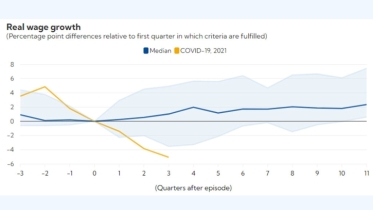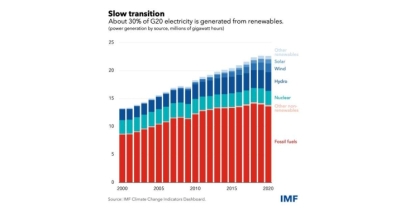Trend of firms’ environmental, social & governance initiatives and their impact
Md Kafi Khan || BusinessInsider

Md Kafi Khan
Firms’ environmental, social and governance (ESG) initiatives have an impact on financial performance. It has also the valuation effects of corporate social performance initiatives. In general, it finds that stakeholder initiatives positively impact valuation effects. Firm-generated controversies may decrease valuation effects in the stock market. Across the world, it has been revealed that ESG initiatives have a significant positive impact on firm performance. The presence of independent board members and ownership by investors is a positive determinant for value creation. The adoption of best-practice corporate governance principles is an important determinant of the valuation of firms. Firms’ propensity to use defence mechanisms decreases valuation effects. Firms usually receive positive valuation effects due to ESG initiatives.
Previously, it was increasingly focused on corporate social relationships, corporate social responsibility and the interface between a firm and society. In terms of corporate social initiatives, developments in the industrial and business world naturally progress, focusing on the improvement of human aspects, environmental preservations and enlightened social consciousness. Advocates of socially responsible actions showcased the benefits that firms receive through improved financial performance.
A modern trend indicates that firms are involved in the integration of environmental, social and governance (ESG) objectives in various functional areas. Firms often advertise their corporate social responsibility (CSR) activities and publish formal reports of CSR accomplishments.
Several thoughts and representations on corporate social performance and corporate financial performance (CSP–CFP) exist. The social impact suggests that satisfying the needs and expectations of various stakeholders may increase financial performance. Advocates of the stakeholder notion argued that firms must engage in socially responsible behaviour aimed at energy conservation and pollution abatement, which would lead to value creation in the form of improved productivity,
corporate reputation and market share. The stakeholder assumes much significance to delineate the appropriate casual relationships between CSP and CFP. The trade-off supposition indicates that resource allocation aimed at achieving social goals may add to the costs for the firms and prevent profit maximization. Traditional logicians indicated that CSP and CFP are negatively related.
In a modern context, firms must focus on profitability, growth potential and social relationships to emerge successful. A social relationship reflects a firm’s diverse commitment to its stakeholders other than profitability and growth potential. It encompasses diverse relationships, such as social, governance and environmental initiatives. The firm’s investment in socially responsible behaviour, such as investments directed towards pollution reduction efforts or energy-saving technologies, positively impacts financial performance.
The doctrines of CSR indicated that firms have moral obligations towards society, which are beyond the concept of profit maximization. Firms create environmental costs through their business operations and are responsible for alleviating these problems. Firms’ socially responsible actions can serve business interests and enhance financial performance. Social responsibility has great significance and relevance in academia and business management.
Across the world, about fifty percentages the global institutional asset base was managed by Principles for Responsible Investment signatories, demonstrating the commitment of financial markets towards the adoption of ESG criteria for investment decisions. Firms incur costs due to ESG initiatives, which are expected to be compensated by the advertising effect of increased brand image, stable revenues from loyal clients, improved employee productivity, decreased risk and reduced capital cost. The underlying premise of this research is to explore corporate CSP as a determinant of CFP. It examines the impact of firms’ ESG initiatives on financial performance. It also compares the valuation effects of CSP initiatives in developed and emerging market firms.
ESG versus investors’ evaluation on corporate:
ESG helps investors evaluate corporate behaviours and determine the firm’s future financial performance. “E” refers to climate change, pollution, environmental management and water scarcity.
“S” refers to employee relations, community involvement, human rights and the involvement of harmful products or services. “G” represents the policies, practices and rules which the firm uses to empower itself. According to ESG reporting significantly impacts a firm’s value.
They highlighted that ESG provides insights into corporate management quality and forecasts firm performance. ESG information can be identified through rating and reporting. The ESG rating analysis is normally based on the publicly available data reported by the companies. Firstly, ESG describes the company’s strategic approach to managing sustainability issues. Secondly, ESG is connected to socially responsible investment, which is a well-recognized investment, and experienced rapid growth among investors. Third, ESG is known as the extra-financial material information of companies in CSR, environmental, sustainability and corporate governance, which are valuable for investors.
ESG Initiatives with CFP remain a central theme:
The compatibility of ESG initiatives with CFP remains a central theme of debate among user groups for over five decades. The majority of previous studies reported on the well-founded business case for ESG investing. The review from 2008 to 2018 proved that ESG and CFP have mixed results. Investing in ESG activities can improve financial performance. Certain studies reported negative effects, with ambiguous or contradictory results. Here are focused on developed market firms. By contrast, the current work focuses on examining and comparing the relationship between ESG and CFP in developed and emerging markets. The empirical evidence, with respect to developed markets, may not be applicable to developing markets. Developed and emerging markets significantly differ in terms of their social, cultural and managerial practices.
Emerging market firms including Bangladesh are characterized by dysfunctional institutional barriers due to state control, challenging business scenarios and weak corporate governance practices.
For four decades, reveals the role and responsibilities of business focused on the business case for CSR. CSP is the outcome of implementing CSR activities, which was related to the firm’s relationships with stakeholders. The extant literature on CSP focused on the relationship between three key factors, namely, the level of corporate sustainability performance, corporate financial performance and the level/quality of corporate sustainability disclosure.
CSP and financial performance are negatively related on the account of costly CSP investments No adequate support establishes that CSP and financial performance are directly related.
A significant association between CSP and financial performance is not supported. Several studies indicated that CSP was positively related to financial performance. The benefits of investing in CSP exceeded the costs.
The study reveals on the relationship between CSP and CFP yielded contradictory results over the last four decades. CSP and CFP are positively, negatively or insignificantly correlated, with various causal directions. Most studies found that CSP and CFP are positively related, as supported by meta-analysis. Studies also documented the negative impact of CSR-related activities and behaviours. These studies indicated that CSR practices can generate unnecessary costs which negated competitive advantages. The KPMG survey revealed that only half of the companies in 2006 disclosed their social and environmental impacts in sustainability or CSR reports, rising to over 80% in 2008. The empirical investigation of the CSP–CFP link requires reorientation to understand its specific dimensions. Numerous studies also tested the mediating mechanism and moderating conditions in CSP–CFP. They also examined the moderating effects of factors such as R&D investments and the firm’s intangible resources, such as innovation, human capital, reputation and culture.
Context of Bangladesh:
In Bangladesh emerging exercises should focus on investigating the impact of specific tools and practices on the concept of CSR as a new governance model within the framework of stakeholder relationships which are beyond mere legal compliance. It should emphasise CSR-related natural environmental drivers.
The adoption of stringent environmental standards may generate a competitive advantage on the account of the differential potential of green production processes. Environmental initiatives such as pollution reduction may lead to productivity gains and cost reductions by lowering the consumption of materials, energy and services. Environmental initiatives can also improve firms’ accessibility to sources of funds in the capital market. Environmental-related pollution initiatives can improve the operational and financial performance of firms.
Reduced environmental performance decreases firms’ financial performance and increases the cost of capital investigated the factors which drive high levels of corporate sustainability performance (CSP). Using a stakeholder framework, the study found that leading CSP firms are significantly larger and have higher levels of growth and higher return on equity than their counterparts.
Concluding thoughts & remarks:
Higher ESG initiatives in terms of resource use, workforce, human rights and CSR strategies are needed to accelerate value creation. In terms of ESG pillar scores, ESG initiatives may lead to significant improvements in valuation effects and ROE (Return on Equity). Firms with higher environmental initiatives can improve shareholders’ wealth (P/E). Social initiatives lead to value creation (Tobin Q). Governance performance also results in high valuation. From the ESG category scores’ perspective, the firms which reduced the use of materials, energy or water, or find eco-efficient sustainable solutions by improving the supply chain management, created a high value. Firms with an innovative strategy to reduce environmental costs and create new market opportunities through new environmental technologies or eco-designed products have high valuation effects. The workforce score was positively related to the valuation measures of ROE The ESG management score was positively and significantly related to ROE.
Addressing the environmental, social and institutional requirements, as well as the different stakeholder requirements, results in value creation for firms, proper plan and strategies should take place in action in this volatile corporate environment. Such sustainability initiatives would be beneficial to investors and other stakeholder groups, such as regulators, policymakers and social stakeholders like community groups. The significance of the positive valuation effects of ESG initiatives indicated that ESG practices can be adopted as a part of the firm’s business strategy. And it should make mandatory provisions and reporting structures for the firms under the corporate governance code that exist in the country.
Md Kafi Khan is the Company Secretary at City Bank Limited
























